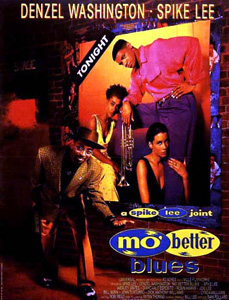Cinematic milestones: #1
The contract was drawn out for a top 10. Don’t we all love them? I hate them. I always have about 55 on my hands, and try as I may to shrink them they only grow. So I’ve decided on a top 11 list, just to keep things nice and prime. I could talk all day about each one, so I restrained myself to a very personal and confined view of each and because I’ve heard some complaints about my far and in-between updates – they will each have their own entry.
These are NOT my favorite 11 movies, these are milestones. Some of them I haven’t even seen more than three times, but each one has radically shaped the way I perceive movies, art, and therefore the universe. They are not appearing in the order they were encountered in since they are cyclical – they reappear every few years, or decades, in a slightly different form. History indeed repeats itself, but it’s the variations that make it all so very interesting.
1 of 11: Mo’ Better Blues
I may have been born yesterday, but I stayed up all night.

Black and white? try again!

Spike Lee took the word ‘color’ and decided, rather than strip it of its anger and its shame and as a consequence -of its vitality, to infuse the word with its actual meaning while keeping the racial context intact: blending the people it was commonly used to describe into our visual and conceptual perception of ‘colored’ people culture – he shows just HOW MUCH color there is to see for those of us who are willing to look beyond the extremes of racism and pc, segregation and affirmative action. Using intense color filmography, Harlem becomes a rainbow (Or more to the point – somewhere over the rainbow). Spike plays Giant, a short, obsessive-compulsive jazz band manager, and he’s as useless as his name suggests.

Giant: ‘You can kiss my ass’
Bouncer: ‘Who says you got an ass? You probably got two legs sticking out your shoulders’

In both extremities of any condition we are always confined to our room, stylistically speaking as well as ideologically, but in between point A and B there is always far more room to run – this is the great wide open. Spike’s (short) story is all about overlooking contradictions and extremes, finding the middle ground somewhere in between black and white (or the different and mo’ better shades of blue.. One of the key characters of this movie is the deliciously complex and often tenderly ambiguous jazz chord structure that never settles for the black and white dichotomy). Watch for a gorgeous Branford Marsalis sax solo prodigiously mimed by Wesley Snipes.
Top 11, eh? Revolutionising the idea of favourites lists?
Warning Comment